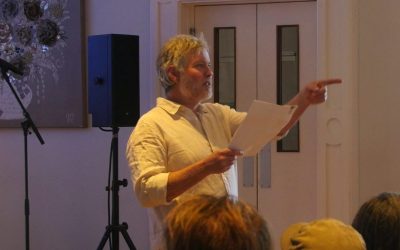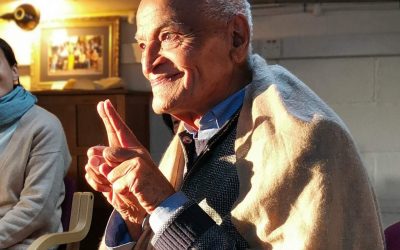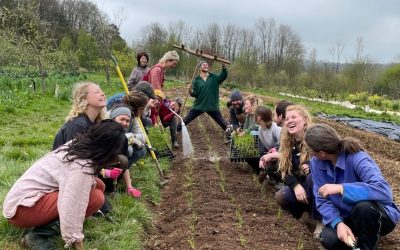overview
- Hone your existing and new education skills for a more just and sustainable society in which people and planet matter
- Gain a broad knowledge of the alternatives that could reimagine and reshape the current education system
- Have a genuinely life-changing experience and be helped by our community to find a greater sense of purpose in a range of learning environments and settings
- Acquire a deeper understanding of how to act as a teacher/educator in the service of resolving the world’s major social and climate issues
COURSE UNDER REVIEW
Learning pathways
Our degrees are designed to suit the complexities of modern life, with low-residency options on many courses and
Some qualifications are offered part-time – these are indicated below.
To get the most out of their course and of being part of our learning community, many students choose a fully immersive experience for the residential taught periods of their course, staying on our stunning 1,200 acre campus on the banks of the River Dart with options for full board accommodation.
MAster's (ft/pt; 180 credits)
MA Education: Transformative Learning is a low-residency programme with 4 x 30-credit modules and 1 x 60-credit Dissertation or Final Project module.
The course is available full time over one year or over two years.
On the two-year pathway students complete modules 1, 2 and 3 in Academic Year 1, and module 4 and the dissertation in Academic Year 2 for the full Master’s.
Postgraduate Diploma (ft/pt; 120 credits)
A full-time (1 year) or part-time programme (2 years, UK students only) with 4 x 30 credit modules. Students taking the full-time option will study all four modules during the first two terms. On the two year pathway students take modules 1, 2 and 3 in academic year 1, and module 4 in academic year 2.
Postgraduate Certificate (60 credits)
A full-time programme with 2 x 30 credit modules. Students will study both modules during term one.
First module only (30 credits)
The first module from this course can be studied on a standalone basis, with 30 credits allocated per module.
To apply for the accredited single module option, apply in the usual way, selecting the ‘Module One’ option during the application process.
course content
This postgraduate degree opens up our distinctive learning model here at Schumacher College to train educators, teachers and curriculum designers in the principles of an ecological approach to education.
For too long mainstream education systems have been outdated and in crisis – what we need are new more nuanced models rooted in experience, working in collaboration with communities, and reigniting widespread attempts to resolve our environmental and social issues.
Here at Dartington we have developed a holistic approach to learning which we believe turns the mainstream upside-down, incorporating head, heart and hands to help students work out how they can act, and crucially empower others to act, towards a regenerative, more hopeful and inclusive future. This new course offers postgraduate students the chance to investigate this model for themselves, honing their own practice as an educator and developing new paths towards the kind of education systems and curricula that contemporary society needs in order to heal and flourish.
Schumacher College and its founder, Satish Kumar, were recently awarded the RSA 2023 Bicentenary Medal for an “outstanding, regenerative and impactful contribution ….. enabling people, places and planet to flourish in harmony.”
Learning at Dartington is:
- practice-led
- experience-based
- immersive
- transformative
- culturally and environmentally sensitive
- founded in nature connection
- interdisciplinary
Students will explore diverse learning approaches from the mainstream to alternatives, including:
- On Country Learning / culturally responsive pedagogy
- First Nation and Sámi learning communities
- Scandinavian folk schools and tradition of friluftsliv
- Czech turistika
- Integrative nature/arts education
- Sustainable and regenerative models
- Adventure and outdoor learning
Progressive education has been trialled and practiced on the Dartington estate for 100 years and, as such, the place and its legacy offer an inspiring and very tangible case study for students interested in exploring the sociohistorical context of education in England. The course is intended to draw on this legacy but with a focus on how it can help inform new approaches and develop and enhance existing pedagogies.
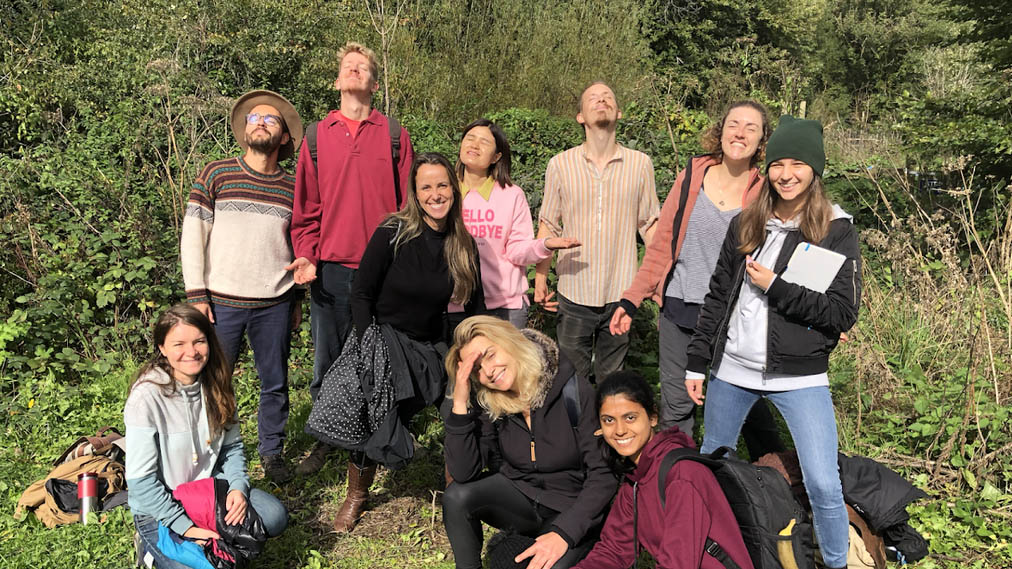
you might be interested in...
Head, Heart, Hands Learning
21-25 August 2023, Dartington Trust estate
An unaccredited Short Course that provides an experiential toolkit for educators looking to develop their practice.
FIND OUT MORE >
programme structure & modules
Here are indicative module descriptions to give you a sense of our plans for how the course will be broken down.
Module 1 – Regenerative Learning
The first module introduces students to a radical revision of learning that takes a wholly integrated approach to learning based on place as community in the context of complex social and ecological systems and key drivers. This focuses on worldviews, deconstructing meaning, power relations and values. The module introduces a deeply place-based course with an emphasis on expanding our understanding of community and practice-led embodied learning in global socioecological contexts.
The module puts first-hand experience of environment at the core of study, whilst placing contemporary sustainability learning in the context of leading theorists, practitioners and educators. Topics covered include regenerative practice, embodiment studies, natural history, ecological literacy, biodiversity, learning in the Anthropocene, nature education, ecopsychology, rites of passage and more.
Students will explore the dynamics of practice-led ecologically focused learning in global contexts and strategies that different stakeholders can leverage to promote change in policy and action. Further, students will examine the ethical and philosophical frameworks of environmental education policy and practice by considering case studies from progressive, transformative educational practitioners, leaders and practices the world over.
Module 2 Learning and Complexity
Module two develops the nature-centred context of a regenerative learning paradigm introduced in the first module to guide students in visualising and representing networks to challenge pervasive divisions between social and ecological domains. Students will explore the relationship and interplay of educational structures and forms within the context of a complex, dynamic and evolving network. Complex more-than-human and human systems on multiple scales – from bacteria and cellular-level systems, mycelium, ocean currents, climate systems, and animal migration to their concomitant human corollaries including community development, social networks, social justice frameworks, political systems, human migrations, displacement and more. The components of complex systems as well as their sympoietic relationships will serve as a model for new socioecological learning frameworks. Topics covered include facilitation, complexity, systems thinking, network visualisation, resilience, socioecological systems.
Module 3 – Global Pedagogical Perspectives
The relationship between environmental and social learning rests in the understanding, visualisation, and integration of network thinking into facilitation, distributed knowledge, curriculum design and teaching. This module builds on the introduction of ecological literacy and community-centred learning in the first two modules to develop a fully bioregional and socioecological framework for learning, including study of diverse learning approaches from friluftsliv and folk schools to on-country learning to First Nation and Sámi learning communities to integrative nature/arts education.
A holistic approach to urban, rural, and wild environments integrated with the study of cultural and social contexts will provide students with the scaffolding to draw on the deeply interwoven strands of social and ecological to develop innovative curricular and facilitation methods. Topics covered include transformative learning theories, global ecological practices, diversity, equity, and inclusion in facilitation and leadership, eco-cosmopolitanism, critical regionalism, deterritorialization, digital experiential learning, arts-based learning.
Module 4 – Environmental Education
As a scaffold for student opportunities for theoretical or practical projects in Module 5, this module guides students in the study of active use of concepts, ethics, judgement, decision making, and engages the study of environmental education policy and practice through case studies from around the world.
Students will explore dynamics of environmentally-focused learning in global contexts and strategies that different stakeholders can leverage to promote changes in policy and action. Further, students will examine the ethical and philosophical frameworks of environmental education policy and practice by considering real-world examples of environmental analysis, impact assessment, modelling, and risk assessment. We will look at the interaction of practice, policy, science, ecological literacy, and environmental ethics across a range of different scales, from local public space access to UN Sustainable Development Goals.
Using the tools of group facilitation and leadership through a regenerative lens, students will frame, develop, and practice skills that can help shift both thinking and practice to make meaningful change in relationships between the human and more-than-human world through their own development of curriculum, programme design, and framing of learning experience. Topics covered include Environmental ethics, policy and law, activism, deep ecology, political ecology, ecofeminism, social ecology, and environmental and climate justice, service learning, and more.
A MA in Transformative Education offered by Schumacher College will be just that – transformative! Learning in an authentic, communal way in the beautiful grounds of Dartington Estate will no doubt enable students with the help of their tutors to really embody an eco-centric orientated educational narrative greatly needed today.
Having been an external advisor on the final approval of this course and seen the rich learning content that it contains, I can honestly say this is the cutting-edge programme us educators have been waiting for to help to shift education into a regenerative and flourishing space for future generations.
entry requirements
Qualification(s) required for entry to the MA
BA/BSc (Honours) Degree A first degree
Where the first degree is not a 2.1, or in an unrelated subject, further support of the application or experience may be required.
Other non-standard awards or experience
A willingness to engage with the field of Transformative Education. Candidates will be considered with prior credited learning and prior experiences subject to interview.* Candidates will be considered with appropriate APL (UoP Regs) subject to interview.
Interview requirements
All applicants are required to attend an interview, either at the College or online. During the interview we will look for: evidence of intellectual clarity during interview; a clearly formulated purpose for taking the course; focused interests and a clear understanding of the ethos and philosophy of the College; readiness and ability to live and work in a communal setting.
*For further information please contact our admissions team at admissions@dartington.org.
fees
Bursaries are available for this course. Please apply by 1 June. For full details on our fees, plus information about scholarships, student loans and bursaries, click here.
This programme is eligible for Chevening Scholarships for international students. Find out more via this link.
staff

Dr Pavel Cenkl
pavel.cenkl@dartington.org
Pavel is Head of Schumacher College, and oversees Programme Development for Movement, Mind, and Ecology.
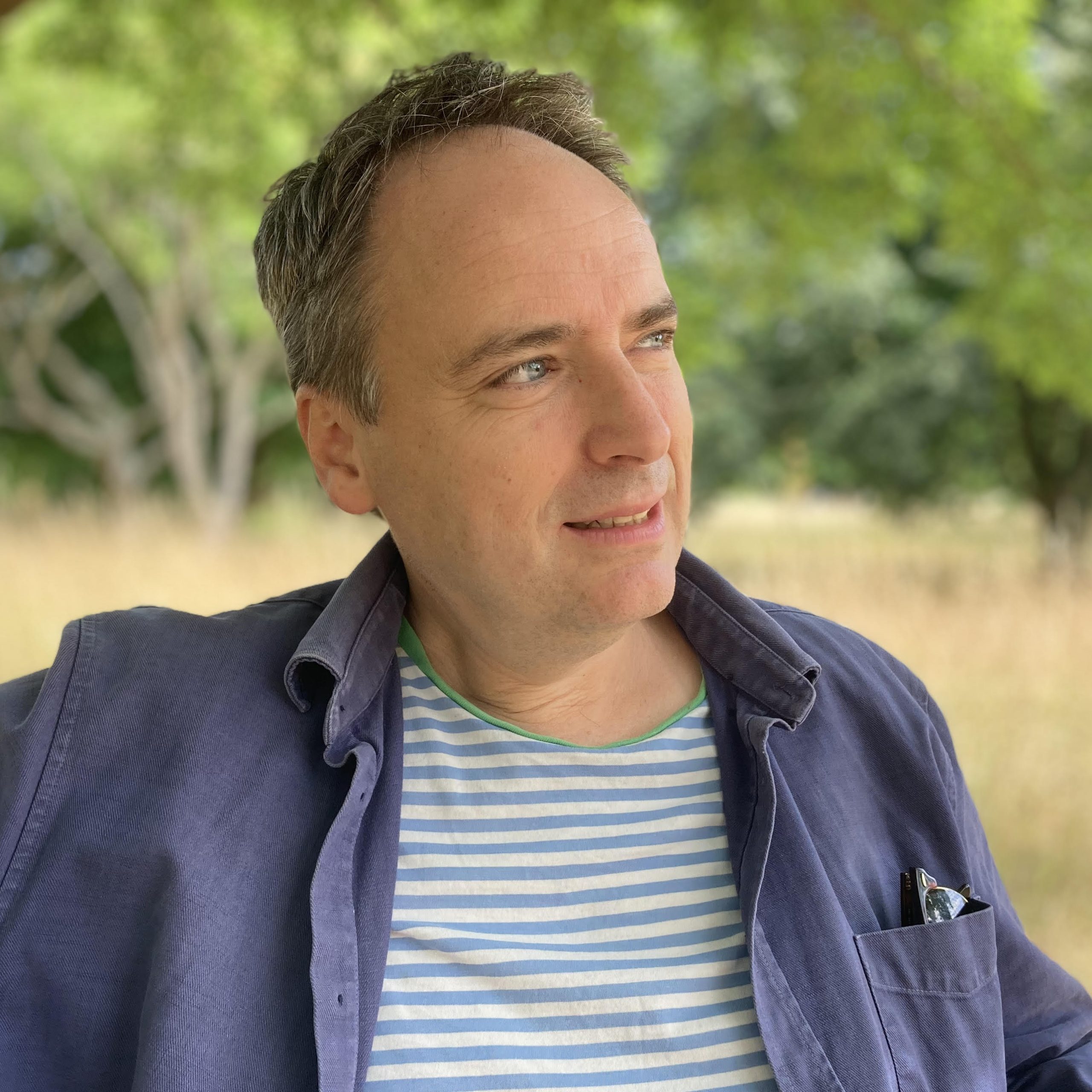
Valentin Gerlier
valentin.gerlier@dartington.org
Scholar, songwriter and musician, Dr Valentin Gerlier is Senior Lecturer and Programme Lead for MA Poetics of Imagination.

Dr Rachel Sweeney
rachel.sweeney@dartington.org
Rachel is Head of Schumacher College Programmes and Programme Lead and Senior Lecturer for Movement, Mind, and Ecology.
careers
We have developed this programme with a sensitivity to those working or aspiring to work both within the mainstream education system and outside of it.
The types of roles that an MA can help you to attain include more senior, higher-paid roles such as:
- Head of year
- Head of department
- Deputy head
- Head teacher
Taking this course can also help you secure more specialist roles working in curriculum development, pastoral care and SEN, or project-based sustainability work.
In broader terms this course is a great way to expand your options, opening up a range of career alternative pathways such as:
- Head of learning at a cultural institution
- Director of education for a local authority or conservation organisation
- Teacher trainer or trainer of trainers
- Education consultant
- Roles in outdoor education
Another career route through this degree would be to open up a more entrepreneurial/activist path through funded community-focused and/or land-based projects or developing new educational businesses.
live chats & open days
latest news & blogs
Fuelling the “can do” possibilities from within local communities
The Local Entrepreneur Forum helps build stronger communities making them more resilient in times of economic challenge.
Satish Kumar and Schumacher College win prestigious medal
The RSA honours the work of the college and its founder for their progressive approach to new economic and ecological education.
Clearing 2023
Throughout the summer, we will be fast-tracking applications for our BSc Regenerative Food and Farming at Schumacher College.


